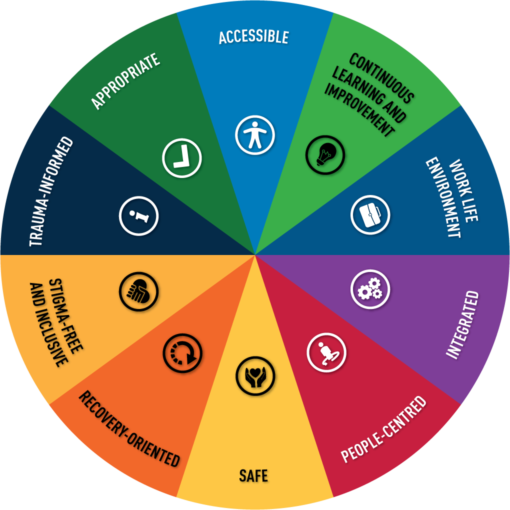This website uses cookies so that we can provide you with the best user experience possible. Cookie information is stored in your browser and performs functions such as recognising you when you return to our website and helping our team to understand which sections of the website you find most interesting and useful.


HealthCareCAN and the Mental Health Commission of Canada spotlight mental health in the workplace
OVERVIEW
HealthCareCAN and the Mental Health Commission of Canada (MHCC) have been working together for over three years to advance mental health in the workplace for the healthcare sector. Together, they led the By Health, For Health Collaborative (the Collaborative), a group of leaders representing over 20 healthcare organizations across Canada who are committed to advancing psychological health and safety in health care.
The Collaborative had a vision for healthcare workplaces to be leaders and role models in providing psychologically healthy and safe environments for all people in Canada. It successfully championed a shift in the healthcare industry to focus on mental health in the workplace, including having the implementation of the National Standard of Canada for Psychological Health and Safety in the Workplace recognized within healthcare organizations as a leading practice by the Health Standards Organization (HSO).
Building on the success of the Collaborative and its initiatives, HealthCareCAN and the MHCC now co-lead the Quality Mental Health Care Network (QMHCN), which unites health sector leaders from across the country in an effort to remove barriers hindering access to high-quality mental health services. The QMHCN addresses structural stigma, promotes recovery-oriented practice, and furthers the work of the Collaborative by continuing to support psychologically healthy and safe workplaces in health care. This includes enabling recovery-oriented practice, addressing stigma, and improving access to quality mental health care across Canada.
HealthCareCAN is leading the development of a Quality Mental Health Care Framework (the Framework), a key initiative by the QMHCN. The Framework defines quality mental health care and the essential quality dimensions that encompass its provision.
BUILDING THE QUALITY MENTAL HEALTH CARE FRAMEWORK
To inform the development of the Framework, HealthCareCAN and the MHCC conducted an environmental scan and reviewed existing provincial and territorial, national, and international quality-care frameworks to identify where the language and concepts of mental health, stigma, and recovery are missing or overlooked.
HealthCareCAN also interviewed QMHCN members and subject matter experts in mental health and research — including HealthCareCAN members Canadian Patient Safety Institute (CPSI), Royal College of Physicians and Surgeons of Canada, The Royal Mental Health Centre, and Waypoint Centre for Mental Health Care.
HealthCareCAN and the MHCC jointly held focus groups with the MHCC’s Youth Council and Hallway Group, while HealthCareCAN led a focus group with Patients for Patient Safety Canada to engage and connect directly with people with lived experience (PWLE).
The key informant interviews identified many vital aspects of quality mental health care, including people-centred, equitable, safe, evidence-based, appropriate, accessible, and timely care. The PWLE further validated and informed the framework, identifying that it must consider the impact of the social determinants of health, alternative therapies, trauma and violence, and inclusivity as well as address the need to be culturally appropriate, culturally safe, and culturally sensitive.
The environmental scan and the key informant interviews identified the HSO/CPSI Canadian Quality and Patient Safety Framework for Health and Social Services as the most relevant for this project. This framework is evidence-based, well-known in Canada, and recognizes healthcare workers specifically.
WHAT IS QUALITY MENTAL HEALTH CARE?
A thorough review of the selected frameworks that address quality health care, interviews with health experts, and insights from PWLE led to a definition and identification of critical dimensions that encompass quality mental health care, emphasizing both patient and provider perspectives.
Figure 1: Framework Dimensions of Quality Mental Health Care
 |
ACCESSIBLE | Having timely and equitable care across the continuum. Promotes prevention and early intervention. Community-based interventions are available. |
 |
APPROPRIATE | Care is evidence informed and culturally competent. |
 |
CONTINUOUS LEARNING AND IMPROVEMENT | Knowledge sharing and capacity building among members of the health-care workforce. Innovative care is encouraged and supported. |
 |
INTEGRATED | Care is continuous across the continuum. Transition into community settings is smooth. The family’s and/or patient’s support system is involved. Integration with services that address social determinants of health. |
 |
PEOPLE-CENTRED | Care that is focused and organized around the health needs and expectations of people and communities rather than on disease.¹ |
 |
RECOVERY-ORIENTED | Living a satisfying, hopeful, and meaningful life, even when there may be ongoing limitations related to mental health problems and illnesses.² |
 |
SAFE | Keeping people and providers safe from preventable harm. Care is culturally safe across the continuum for individuals and community. |
 |
STIGMA-FREE AND INCLUSIVE | Care addresses drivers of mental health stigma and prevents stigma practices in mental health care. Healthcare providers are comfortable in coming forward with their mental health problems and illnesses at work. Addresses multiple layers of stigma (individual, interpersonal, intersectoral, and structural). A need to better support individuals who have experienced stigma and discrimination. Individuals feel respected and valued. |
 |
TRAUMA-INFORMED | Recognizes the impacts of trauma and violence on individuals receiving mental health care services. |
 |
WORK-LIFE ENVIRONMENT | A healthy workplace environment supports provider wellness and promotes psychological safety. |
MOVING THE FRAMEWORK INTO PRACTICE
The QMHCN continues to prioritize and improve mental health care services in Canada and will collaborate on next steps for the Canadian Quality and Patient Safety Framework for Health and Social Services to customize a mental health environment based on the insights gleaned from the key informant interviews and focus groups. Implementation will include knowledge products such as those that disseminate key findings for improving mental health care in Canada through infographics, utilizing HealthCareCAN’s and the MHCC’s networks, and through messaging via social media.
A comprehensive approach to mental health means that health-care providers and health leaders must provide quality care that meets the needs of their communities and continuously improves the care provided in all healthcare settings.
PUBLISHED
October 20, 2020
FOR FURTHER INFORMATION
Siri Chunduri
Policy and Research Analyst
schunduri@healthcarecan.dev2.inter-vision.ca
Emily Follwell
Policy and Research Analyst
efollwell@healthcarecan.dev2.inter-vision.ca
Jonathan Mitchell
Vice President – Research and Policy
jmitchell@healthcarecan.dev2.inter-vision.ca
Related:
Submission to the Federal Government’s Consultation on Artificial Intelligence (AI) Compute






